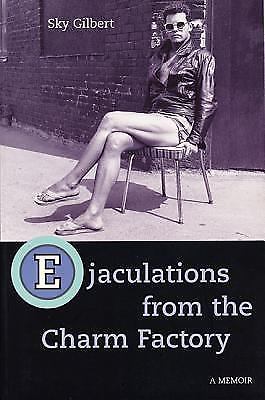 Ejaculations from the Charm Factory
Ejaculations from the Charm Factory
by Sky Gilbert
Published by ECW Press
Published November 1, 2000
History (biography/memoir)
272 pgs. • Find on Amazon.com
Reviewed by Stephen O. Murray
October 31, 2003
The aging enfant terrible of Toronto avant-garde theater filbert engagingly begins his 2000 memoir, Ejaculations from the Charm Factory, by expressing trepidation about who would be interested in reading it:
What is there about Sky Gilbert’s life that’s going to hold anyone’s interest through a whole book? I certainly don’t think my personal history is particularly fascinating to anyone but a dear friend.
In this, I think he is somewhat wrong in that what he writes about his personal life is interesting. Not all the accounts of infighting in his professional life are, though some of the general forces he analyzes are.
Gilbert tentatively suggests that “if this book has any value, it will be because of the important period of time onto which my life has trespassed. This memoir spans the 18 years, from 1979 to 1997, when I was Artistic Director of Buddies in Bad Times Theatre in Toronto.” He sees those years as the ebbing of risk-taking avant-garde theater in Toronto, as well as years of backing off from the sexual revolution, not least by respectability-craving gay conservatives.
The title contrasts the frothy, money-making, comfort-inducing theatrical productions of the “charm factory” with the unsettling, in-your-face ejaculations.
Before writing about the memoir, I wanted at least to read some of his plays (the six in This Unknown Flesh). That, in turn made me wish for another collection including “Cavafy, or the Veils of Desire,” “The Dressing Gown,” “Radiguet,” “Lacey, or Tropicsnow,” and “Ban This Show” (about Robert Mapplethorpe and Patti Smith). This book makes me sorry to have missed seeing the mountings of plays by Buddies (I also missed a chance to see one that traveled to San Francisco with Gilbert playing one of the “Drag Queens in Outer Space”).

Gilbert is caustically funny about critics, particularly those with internalized homophobia (closeted gay critics mincing around the blunt sexuality of many of the Buddies plays: “My open existence is terrifying and disgusting to them: closet cases and ‘nice’ homosexuals hate me because I talk about gay sex and culture”), and he chronicles the wear and tear of large egos in “The Theatre” (not that his own was/is small), public arts funding agencies, and within the sexual revolution in ways that provide enlightenment rather than just settling local scores on the Toronto scene(s).
What he writes about his own loves and losses is interesting to someone who knows/knew none of them and nothing about them other than what Gilbert wrote. (I don’t think he needed to have worried on that score. He should have believed his own analysis in the following: “I suppose that most ‘normal’ people think sexual details are too private. But sexual people, people who are as relaxed about having sex as they are about eating dinner, don’t think that.”)
What he writes about other playwrights is invariably discerning (Bertholt Brecht and Tennessee Williams at the greatest length), and the pictures are interesting and helpful. But what I like best is the very clear statements of the anti-assimilationist perspective. As the venerable Toronto gay activist Jim Eigo puts it, “What’s the use of being gay if you can’t be different?”
There are several extended critiques of respectability-craving lesbians and gay men. Here is a briefer one about the Metropolitan Community Church that provides the flavor of his animus:
It’s difficult for me to understand why gays and lesbians would choose to ally themselves with Christianity, because it’s so repressive. For the stay-at-home dykes and fags who like to pretend they’re just “normal” people, going to church provides a lot of comfort. The gay/lesbian church, from what I’ve seen of it, has all the prerequisites of most Christian denominations: it’s boring and unsexual and everyone stands around drinking bad coffee and talking about God in a way that doesn’t really affect their daily life.
An Orton-like disdain, eh? Gilbert the memoirist and analyst of gay life and culture is at his best when he lets fly. In writing about those who disappointed him on the Buddies board and boards, he seems to me to pull some of his punches…but, as in Hawthorne, skipping on worked for me. Not skipping over, because I thought that a number of supporting characters (many of them non-supportive) are vivid in his memoir and many of the battles were over celebrating/marginalizing gender and sexual variance(s).
published on epinions 31 October 2003
©2003, 2016, Stephen O. Murray

